Local
Hundreds march against anti-LGBT violence
D.C. police chief, four Council members join demonstration
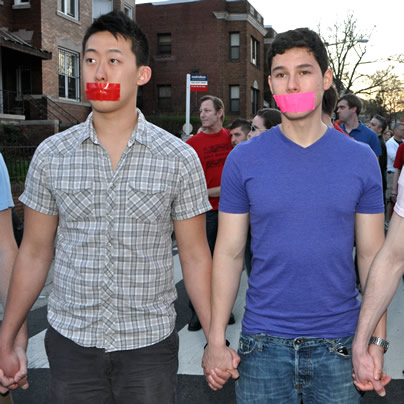
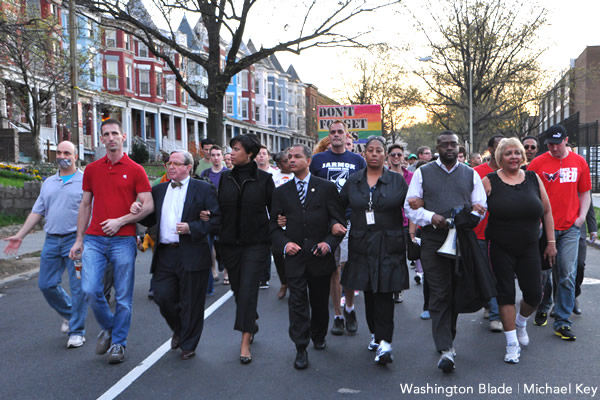
Mayor's Office LGBT liaison Jeffrey Richardson, and council members Muriel Bowser and Jim Graham join D.C. residents in calling for an end to anti-LGBT violence. (Washington Blade photo by Michael Key)
As many as 700 people turned out for a march through the streets of Washington, D.C., Tuesday night to take a stand against anti-LGBT violence following separate attacks against two gay men and a transgender woman during a two-day period earlier this month.
Friends of one of the two gay male victims, who organized the march, said they were astonished over the outpouring of support that emerged from the LGBT community and city officials, including D.C. Police Chief Cathy Lanier and four members of the City Council.
“It was a Facebook event and I expected maybe 15 to 50 people to show up,” said Patrick Pressman, one of the lead organizers. “And then from there it just exploded,” he said. “It got to where it was today, when it was estimated that about 700 people were going to attend.”
Pressman said he is a friend of a 29-year-old gay man who was robbed and badly beaten on March 12 by assailants who called him anti-gay names at Georgia Avenue and Irving Street, N.W.
The march started outside the International House of Pancakes restaurant at 14th and Irving streets, N.W., in Columbia Heights, where a 31-year-old gay man was shot about 6 a.m. Sunday, March 11, in what police say was an altercation with two men who called him anti-gay names.
Lanier, who spoke to the marchers as they gathered outside the IHOP restaurant, said she expects an arrest in the case soon, saying she is “very pleased” with the progress of the investigation.
“We have everybody working on this and I think everybody’s committed,” she said. “We kind of take it personally when people in our community are targeted.”
SEE DOZENS OF PICTURES FROM THE MARCH IN THE WASHINGTON BLADE PHOTO GALLERY HERE.
Police said the victim of the IHOP shooting was fortunate to have received a non-life threatening gunshot wound. His cousin, who was with him at the time of the shooting, said the victim was expected to be released from the hospital this week after being treated for a punctured liver.
Gay D.C. Council member Jim Graham (D-Ward 1), who participated in the march, said he was especially concerned that two of the incidents took place in his ward. He said the large showing of support for the march demonstrates that the community is outraged over anti-LGBT violence.
From the IHOP, the march traveled east on Irving Street to Georgia Avenue, the site where the 29-year-old gay man was attacked and beaten about 9:30 p.m. on March 12.
Police said the transgender woman was attacked and knocked unconscious about 11:45 that same night at the intersection of West Virginia Avenue and Mt. Olivet Road, N.E. People who know the victim said she reported later that she was not robbed and thought the attack was motivated by anti-transgender bias.
But police say, unlike the other two incidents, they have not listed the case as a hate crime because they don’t have sufficient evidence for such a classification. Assistant D.C. Police Chief Peter Newsham told a meeting of the Gertrude Stein Democratic Club Monday night that investigators were looking for witnesses who might have heard whether the attackers hurled anti-trans names at the victim.
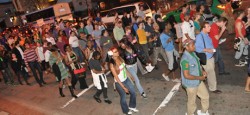
Hundreds of marchers joined the hastily assembled march organized after a recent spate of anti-gay violence in the nation's capital. (Washington Blade photo by Michael Key)
Newsham said investigators believe the three incidents were unrelated, with the attacks carried out by different groups of perpetrators.
The march paused when it reached the site where the 29-year-old gay man was attacked at Georgia Avenue and Irving Street.
“I want to say that this walk should never have to happen again in our city,” said D.C. Council Chair Kwame Brown (D-At-Large). “We have to do more. We must do more,” he said. “And for those who know about this horrific situation that took place, I’m begging you to come forth. Give us information … to bring these folks to justice.”
Brown was referring to reports by police that many people were on the street in the vicinity of the attack at the time it occurred.
Council members Michael Brown (D-At-large) and Muriel Bowser (D-Ward 4) also participated in the march, saying they were in solidarity with the LGBT community in seeking ways to curtail hate violence against all city residents.
Also participating in the march was Jeffrey Richardson, director of Mayor Vincent Gray’s Office of LGBT Affairs, and Gustavo Velasquez, director of the D.C. Office of Human Rights. Richardson spoke at the gathering outside the IHOP restaurant.
Among those speaking at the Georgia Avenue and Irving Street site was A.J. Singletary, president of the D.C. group Gays and Lesbian Opposing Violence (GLOV). Singletary said he learned from the 29-year-old gay victim’s partner that the victim had been released from the hospital Tuesday, the day of the march.
“His jaw was shattered in two places,” said Singletary. “After two surgeries he now has permanent titanium plates holding his lower jaw together. In addition, his jaw is wired shut for the next four to six weeks.”
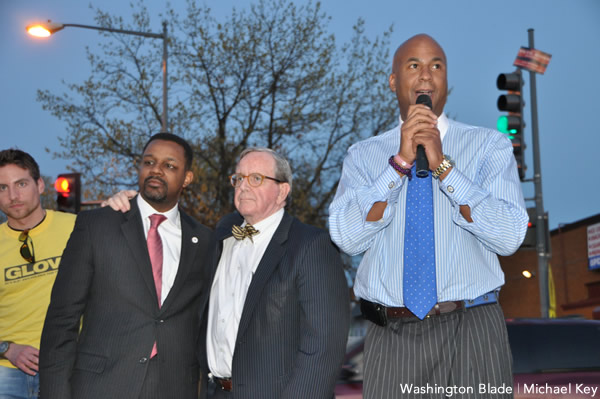
A.J. Singletary, Kwame Brown, Jim Graham, and Michael Brown at the rally. (Washington Blade photo by Michael Key)
The march continued south on Georgia Avenue to U Street, where it turned right and traveled to 14th Street. From there, with spectators looking on from the sidewalks, it traveled south on 14th to R Street, where it turned right and continued to its termination at 17th Street next to the gay bar Cobalt. Many of the marchers entered Cobalt, which hosted a fundraiser for the victim attacked at Georgia Avenue and Irving Street.
Gay Democratic activist Cartwright Moore, a member of the staff of D.C. Congressional Del. Eleanor Holmes Norton, said many of the march participants were young LGBT people who don’t ordinarily attend meetings of local LGBT organizations.
“It’s been great that the community has come together on an issue like this,” said D.C. resident Chris Shank, who said he learned about the march through a Facebook invitation.
“I marched the entire way,” he said. “I’m really glad it was organized. I think the response has been enormous.”
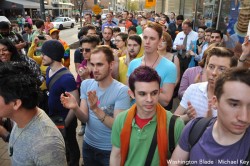
The event was largely organized through social networks like Facebook and Twitter, and the overwhelming number of young people in the crowd reflected these new media organizing tactics. (Washington Blade photo by Michael Key)
D.C. resident Phillip Pratt said he, too, learned of the event through Facebook. He said he became motivated to get involved after seeing that just a few days after organizers posted the event more than 500 people had committed to joining the march.
“I think it was very important to come out and march for this, to march with them and show our support,” he said.
Vic Suter said she wanted to take a stand against violence targeting her own community.
“Whether there be a thousand people marching down the street or five, it says that people are not going to tolerate such behavior and that we need to bring about tolerance and we need to teach the community that people are people regardless of who they love,” she said.
Asked if he thought the event would have an impact on the community, Singletary said he was hopeful that it would.
“We have a group of many hundreds walking down the middle of the street down major thoroughfares in D.C. where a lot of hate crimes have occurred,” he said while marching. “You’re talking about U Street, you’re talking about 14th Street. The street we’re on now is R. There have been a lot of attacks on this street itself. So the response by the community has been big and rightfully so.”
Virginia
McPike wins special election for Va. House of Delegates
Gay Alexandria City Council member becomes 8th LGBTQ member of legislature

Gay Alexandria City Council member Kirk McPike emerged as the decisive winner in a Feb. 10 special election for a seat in the Virginia House of Delegates representing Alexandria.
McPike, a Democrat, received 81.5 percent of the vote in his race against Republican Mason Butler, according to the local publication ALX Now.
He first won election to the Alexandria Council in 2021. He will be filling the House of Delegates seat being vacated by Del. Elizabeth Bennett-Parker (D-Alexandria), who won in another Feb. 10 special election for the Virginia State Senate seat being vacated by gay Sen. Adam Ebbin (D-Alexandria).
Ebbin is resigning from his Senate next week to take a position with Virginia Gov. Abigail Spanberger’s administration.
Upon taking his 5th District seat in the House of Delegate, McPike will become the eighth out LGBTQ member of the Virginia General Assembly. Among those he will be joining is Sen. Danica Roem (D-Manassas), who became the Virginia Legislature’s first transgender member when she won election to the House of Delegates in 2017 before being elected to the Senate in 2023.
“I look forward to continuing to work to address our housing crisis, the challenge of climate change, and the damaging impacts of the Trump administration on the immigrant families, LGBTQ+ Virginians, and federal employees who call Alexandria home,” McPike said in a statement after winning the Democratic nomination for the seat in a special primary held on Jan. 20.
McPike, a longtime LGBTQ rights advocate, has served for the past 13 years as chief of staff for gay U.S. Rep. Mark Takano (D-Calif.) and has remained in that position during his tenure on the Alexandria Council. He said he will resign from that position before taking office in the House of Delegates.
Local
Local LGBTQ groups, activists to commemorate Black History Month
Rayceen Pendarvis to moderate Dupont Underground panel on Sunday
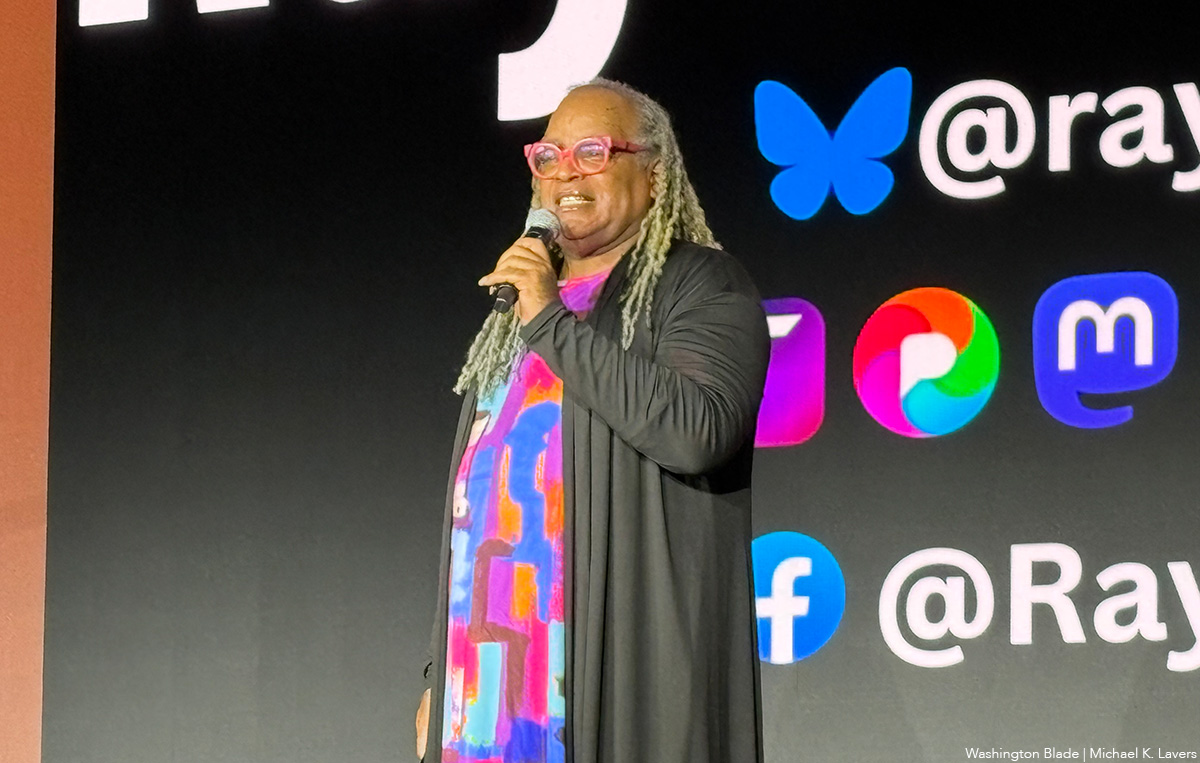
LGBTQ groups in D.C. and elsewhere plan to use Black History Month as an opportunity to commemorate and celebrate Black lives and experiences.
Team Rayceen Productions has no specific events planned, but co-founder Rayceen Pendarvis will attend many functions around D.C. this month.
Pendarvis, a longtime voice in the LGBTQ community in D.C. moderated a panel at Dupont Underground on Feb. 8. The event, “Every (Body) Wants to Be a Showgirl,” will feature art from Black burlesque artists from around the country. Pendarvis on Feb. 23 will attend the showing of multimedia play at the Lincoln Theatre that commemorates the life of James Baldwin.
Equality Virginia plans to prioritize Black voices through a weekly online series, and community-based story telling. The online digital series will center Black LGBTQ voices, specifically trailblazers and activists, and contemporary Black queer and transgender people.
Narissa Rahaman, Equality Virginia’s executive director, stressed the importance of the Black queer community to the overall Pride movement, and said “Equality Virginia is proud to center those voices in our work this month and beyond.”
The Capital Pride Alliance, which hosts Pride events in D.C., has an alliance with the Center for Black Equity, which brings Black Pride to D.C. over Memorial Day weekend. The National LGBTQ Task Force has no specific Black History Month events planned, but plans to participate in online collaborations.
Cathy Renna, the Task Force’s director of communications, told the Washington Blade the organization remains committed to uplifting Black voices. “Our priority is keeping this at the forefront everyday,” she said.
The D.C. LGBTQ+ Community Center is also hosting a series of Black History Month events.
The D.C. Public Library earlier this year launched “Freedom and Resistance,” an exhibition that celebrates Black History Month and Martin Luther King Jr. It will remain on display until the middle of March at the Martin Luther King Jr. Memorial Library at 901 G St., N.W.
District of Columbia
U.S. Attorney’s Office drops hate crime charge in anti-gay assault
Case remains under investigation and ‘further charges’ could come

D.C. police announced on Feb. 9 that they had arrested two days earlier on Feb. 7 a Germantown, Md., man on a charge of simple assault with a hate crime designation after the man allegedly assaulted a gay man at 14th and Q Streets, N.W., while using “homophobic slurs.”
But D.C. Superior Court records show that prosecutors with the Office of the U.S. Attorney for D.C., which prosecutes D.C. violent crime cases, charged the arrested man only with simple assault without a hate crime designation.
In response to a request by the Washington Blade for the reason why the hate crime designation was dropped, a spokesperson for the U.S. Attorney’s office provided this response: “We continue to investigate this matter and make no mistake: should the evidence call for further charges, we will not hesitate to charge them.”
In a statement announcing the arrest in this case, D.C. police stated, “On Saturday, February 7, 2026, at approximately 7:45 p.m. the victim and suspect were in the 1500 block of 14th Street, Northwest. The suspect requested a ‘high five’ from the victim. The victim declined and continued walking,” the statement says.
“The suspect assaulted the victim and used homophobic slurs,” the police statement continues. “The suspect was apprehended by responding officers.”
It adds that 26-year-old Dean Edmundson of Germantown, Md. “was arrested and charged with Simple Assault (Hate/Bias).” The statement also adds, “A designation as a hate crime by MPD does not mean that prosecutors will prosecute it as a hate crime.”
Under D.C.’s Bias Related Crime Act of 1989, penalties for crimes motivated by prejudice against individuals based on race, religion, sexual orientation, gender identity, disability, and homelessness can be enhanced by a court upon conviction by one and a half times greater than the penalty of the underlying crime.
Prosecutors in the past both in D.C. and other states have said they sometimes decide not to include a hate crime designation in assault cases if they don’t think the evidence is sufficient to obtain a conviction by a jury. In some instances, prosecutors have said they were concerned that a skeptical jury might decide to find a defendant not guilty of the underlying assault charge if they did not believe a motive of hate was involved.
A more detailed arrest affidavit filed by D.C. police in Superior Court appears to support the charge of a hate crime designation.
“The victim stated that they refused to High-Five Defendant Edmondson, which, upon that happening, Defendant Edmondson started walking behind both the victim and witness, calling the victim, “bald, ugly, and gay,” the arrest affidavit states.
“The victim stated that upon being called that, Defendant Edmundson pushed the victim with both hands, shoving them, causing the victim to feel the force of the push,” the affidavit continues. “The victim stated that they felt offended and that they were also gay,” it says.
-

 New York4 days ago
New York4 days agoPride flag removed from Stonewall Monument as Trump targets LGBTQ landmarks
-

 Italy5 days ago
Italy5 days agoOlympics Pride House ‘really important for the community’
-

 Florida4 days ago
Florida4 days agoDisney’s Gay Days ‘has not been canceled’ despite political challenges
-

 Philippines4 days ago
Philippines4 days agoPhilippines Supreme Court rules same-sex couples can co-own property



















